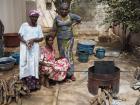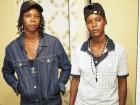13. April 2020 | Coronavirus: together we can come out stronger and united (theafricareport)
50 African intellectuals including Kako Nubukpo, Alioune Sall, Carlos Lopes, Cristina Duarte, Felwine Sarr, Achille Mbembe, Reckya Madougou, Souleymane Bachir Diagne, Franck Hermann Ekra and Hakim Ben Hammouda co-signed this call to mobilize the intelligence, resources and creativity of Africans to defeat the COVID-19 pandemic. Bitte hier klicken, um zum Orginalbeitrag zu kommen
Severe Acute Respiratory Ryndrome Coronavirus 2, (SARS-CoV-2), is the scientific name for the virus responsible for a highly contagious and potentially fatal respiratory disease. Initially an epidemic and then reclassified as a pandemic by the WHO on 11 March 2020, its devastating effects are sowing death, plunging the most powerful economies into recession.
The virus could be a precursor to disastrous days ahead for the African continent and its inhabitants. Africa is not where this pandemic started, yet it is facing its harsh effects, through increasing human contagion and the sharp contraction of a significant part of essential social and economic activities.
Rational response
The continent must therefore provide an essential, powerful and sustainable response to a real threat that should neither be exaggerated nor minimized, but rather tackled rationally.
The Malthusian prognosis, which is being used in this this pandemic for a thinly veiled speculation on the so-called excessive African demography, which is now the target of the new civilizers, must be defeated.
The crisis is a historic opportunity for Africans to mobilize their resources that are spread spread over all continents – traditional, diasporic, scientific, new, digital, their creativite – to emerge stronger from a disaster that some have already predicted for them.
In the next few days we will exceed the 2 million mark of COVID-19 infections. The virus continues to spread with speed with the focus now turning to the readiness of health systems in African countries in the face of the virus. The supply of health services, equipment, and qualified personnel, is now the source of all concern.
The WHO has even recently called on African countries to “wake up” and “expect the worst”.
Least impact, for now
It should be recalled that Africa is, for the moment, the least impacted continent, with its first case confirmed in February 2020 in Egypt. Fears about the impatc of the virus on Africa so far, lack concrete and documented justifications.
Yes, local ecosystems, demographic factors, the mutated nature of the virus, the intensity of international traffic and other elements will limit the spread of the pandemic. Though it remains hypothetical, it is also necessary to note the impact of several drastic measures decided by governments: closures of borders, schools, businesses and worship places.
Notwithstanding the stressful nature of the pandemic, local political contexts more generally lead to an eager social demand in search of efficiency. The observation of uneven public responses around the world and the relative unpredictability of the pandemic may explain a process of trial and error.
State of public health systems
While the responsiveness of African countries remains varied, we must quite rightly acknowledge and remember the catastrophic effect of decades of structural adjustment on public health and health provision in African countries. In spite of everything, many health systems have substantially evolved, driven by the determination to achieve the Sustainable Development Goals (SDGs) by 2030, notwithstanding the gaps to be filled and the obvious failures.
Depending on the country, the state of African health equipment is certainly unsatisfactory and health services are ill-equipped overall, but it would be wrong to portray non-existent health systems, paving the way for an inevitable decline. Moreover, health care is often social and community-based, relying also on cultural ties that require solidarity and family management of disease.
Unjustified worst-case scenarios
For these reasons, self-fulfilling prophecies cannot be justified. Disaster scenarios, considered all over the continent, could de facto have a negative impact on economies and risk assessments generally unfavorable to Africa prior to COVID-19, with investors in complete uncertainty.
Health systems in Africa need to be totally revamped in the light of many current considerations and limitations. We should not wait for the possible breakdowns caused by a pandemic of this magnitude before acting diligently and effectively.
A number of actions should be taken:
In the short term, a real economic union of African countries could enable the pooling of responses to the risks generated by COVID-19 and beyond. The multiple initiatives launched to mobilize sufficient financial resources to prevent a major economic crisis from being added to the announced health crisis are to be welcomed. We strongly advocate both rigorous management of these resources and efficient sub-regional and regional coordination of actions, in order to achieve synergy and complementarity between these initiatives.
Likewise, the sharing of knowledge, know-how and medical equipment will be a decisive element. African medicinal understanding, which has originated from the continent’s enormous cultural and traditional heritage should be further mobilized, mutualized, pan-Africanized, in association with medicine and modern research, as has been successfully done in some countries such as China. Local creativity and ingenuity should be stimulated, and the handicrafts offer should be enhanced, following the example of the new hygienic moisturizing equipment proposed in many countries (ex. Ghana, Cameroon, et al.)
Africa must learn from its experience and from other parts of the world affected by the pandemic, and should further promote solidarity it possesses, mass awareness, especially in rural areas, and mass testing of populations. Early examples of success stories show that it is not necessarily the abundant resources of countries with very high GDPs that provide the best health results. Vietnam, for example, has donated 550 000 masks to five European Union countries, and even Cuba has exported its emergency medicine to so-called developed countries. Coronavirus could mark a sort of ‘end of history’ and the development of alternative models. It is up to Africa to invent its own. Our continent has extensive resources, a flexible and creative creative workforce, and professionals trained to resist and defeat the pandemic. This would require making the right decisions and adjusting them as necessary. The existence of a new consciousness linking the continent to its diasporas, its new networks of intellectuals, professionals, researchers, activists, associations, politicians, and independents, should be able to bring new and disruptive voices to these debates.
In the medium term, the main lesson of the COVID-19 crisis should be that Africa will continue to be all the more vulnerable to exogenous shocks if it does not find a structural response to its development challenges. This is as valid for health as it is for any other area. Indeed, health dependency remains a thorny problem and the cost of medical evacuations of elites is a case of social injustice and economic irrationality, since many of these services can be provided in Africa at lower cost. The perpetuation of a cash economy model, based on the export of unprocessed raw materials while waiting for volatile external revenues, is suicidal. The urgent tasks for Africa are the local production of quality health services, the local processing of raw materials to create value and employment, and productive base diversification.
“Reactivate Afro-pessimism”
While COVID-19 brings economies to a standstill and disrupts the functioning of societies, it is paradoxically time for Africa to overcome its challenges and find a new place in the world. Of course, the challenge we are facing is major because, in addition to our sluggish economies, the coronavirus pandemic has given some Western treasuries the opportunity to reactivate an Afro-pessimism that was thought to be from another age.
In some scenarios, Africa is a vulnerable continent, where the dead could be counted not in thousands but in millions of people. We must affirm that this scenario is not an inevitability from which the continent cannot escape. It speaks more about its authors than about the reality in Africa, where the future cannot be pre-empted and assumed to bleak in principle.
It is time to remember that periods of world upheaval have always brought about a paradigmatic, cultural and sometimes civilizational renewal for those who embrace the demands of change. We must therefore face up to the challenges that lie ahead and resolutely engage in the necessary struggles.
Time for enlightenment
We call upon on all African intellectuals, researchers from all disciplines and the dynamic forces of our countries to join the fight against the COVID-19 pandemic, to enlighten us with their thoughts and talents, to enrich us with the fruits of their research and with their constructive proposals. We must set an optimistic course, while being courageously aware of the gaps that need to be filled.
Another Africa is possible as is another humanity in which compassion, empathy, equity and solidarity would define societies. What might have seemed like a utopia has now entered the realm of the possible. History is watching us and will condemn us if we allow ourselves to conjugate our future in the past tense.
Let us dare to remain confident in the future or in ourselves. Let us dare to fight together against the spread of COVID-19, let us dare to defeat together the global precariat created by the eponymous pandemic.
Yes, Africa will defeat the coronavirus and will not collapse.
This piece was co-signed by: Kako Nubukpo, Alioune Sall, Reckya Madougou, Martial Ze Belinga, Felwine Sarr, Carlos Lopes, Cristina Duarte, Achille Mbembe, Francis Akindès, Aminata Dramane Traore, Souleymane Bachir Diagne, Lionel Zinsou, Nadia Yala Kisukidi, Demba Moussa Dembélé, Franck Hermann Ekra, Alinah Segobye, Mamadou Koulibaly, Karim El Aynaoui, Mamadou Diouf, Hakim Ben Hammouda, Paulo Gomes, Carlos Cardoso, Gilles Yabi, Adebayo Olukoshi, Augustin Holl, Abdoulaye Bathily, Cheryl Hendricks, Lala Aicha Ben Barka, El Hadj Kassé, Taoufik Ben Abdallah, Frédéric Grah Mel, Didier Acouetey, Yousra Abourabi, Didier Awadi, Marguerite Abouet, Valsero, Smockey, Monza, Fadel Barro, Lassane Zohoré, Mehdi Alioua, Véronique Tadjo, Madani Tall, Willy Zekid, Khadja Nin, Qudus Onikeku, Folashade Souley, Teddy Mazina, Joseph Tonda, Tiken Jah Fakoly



